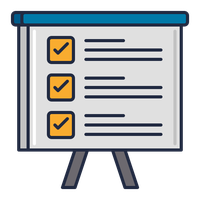Teaching
Our focus in academic teaching is on courses at the interface between management science and computer science. Lectures and exercises are designed to provide students with strong quantitative skills that form the basis for a profound understanding of data science methods and data-driven decision making. Bachelor’s and master’s theses are typically embedded in our own research context and pave the way for students' own research efforts. Hands-on supervision enables students to already achieve meaningful successes and find enthusiasm for research.
- Overview of courses
-
Overview of Courses
SS 2023 WS 23/24 SS 2024 Bachelor Data Science for Management ✅ ✅ Proseminar ✅ Bachelor's Theses ✅ ✅ ✅ Master Text Mining ✅ Seminar ✅ ✅ Master's Theses ✅ ✅ ✅
- Course: Data Science for Management
-
Course: Data Science for Management (B. Sc.)

Prior to the start of the Information Age, companies were forced to collect data from non-automated sources manually. As a result, company decisions were frequently based on gut feeling and intuition. With the emergence of ubiquitous computing technology, company decisions nowadays rely strongly on data science methods and machine learning.
The course “Data Science for Management” provides an overview of the multi-disciplinary field of data science for management students. Topics include (but are not limited to) data collection, integration, management, modeling, analysis, visualization, prediction and data-driven decision making. The course includes practical sessions focusing on data analysis and programming in R.
The main objectives of this course are:
- Understand the basic concepts and business relevance of data science and data-driven decision making
- Gain an overview of different methods, algorithms and software tools for data science applications
- Understand the pitfalls and myths of data science
Organization:
- Module codes: 02-Meth:BSc-B11-Extra1 & 02-Meth:BSc-Extra6CP
- Lecturer: Prof. Dr. Nicolas Pröllochs (BWL XI)
- Term: Summer semester 24
- Language: German
- Course format: Lecture (6 CP)
- Grading: Final exam
- Schedule: See course flyer
- Course: Text Mining
-
Course: Text Mining (M. Sc.)

The digital age has ignited a burst in the volume of textual materials available to businesses and the public. Text mining provides computational techniques to derive actionable (managerial) insights from such unstructured data sources. The course “Text Mining” provides students with an overview of a wide range of text mining methods: from regular expressions to lexicon-based sentiment analysis, to more complex machine learning approaches and supervised text classification. At the end of the course, participants will be familiar with the most important concepts, principles, and algorithms in text mining. The course includes practical sessions focusing on text mining in R. Basic experience in R programming is desirable but not mandatory.
The main objectives of this course are:
- Understand the basic concepts of text mining and its relevance for business applications
- Gain an overview of different methods, algorithms and software tools for extracting knowledge from unstructured text data
- Practice the implementation of text mining applications in R
Organization:
- Module codes: 02-BWL/VWL:MSc-B11-1
- Lecturer: Prof. Dr. Nicolas Pröllochs (BWL XI)
- Course format: Lecture (6 CP)
- Term: Winter semester 23 / 24
- Language: English
- Grading: Presentation & Term Paper
- Schedule: See course flyer
Course evaluation by students (2019 – 2022): 1.4
The number of participants is limited to a maximum number of 24 students. Please register for the course by sending an e-mail to datascience@wirtschaft.uni-giessen.de (see course flyer). The application deadline is October 2, 2023 (early applications are encouraged). The course is also opened to interested bachelor students currently enrolled in the 210- and 240-CP programs.
- Proseminar (B. Sc.) and Seminar (M. Sc.) in Data Science
-
Proseminar (B. Sc.) and Seminar (M. Sc.) in Data Science

Data science is the field of study that combines domain expertise, programming skills, and knowledge of maths and statistics to extract meaningful insights from data. In this seminar, we will focus on Data Science methods and tools. Examples include machine learning models, data visualization, model selection, clustering, and forecasting. We will also review best practices in scientific writing. Students are welcome to propose seminar topics based on their personal interests. Basic experience in R programming is desirable but not mandatory. Please indicate your level of programming expertise. Individual assignments will consist of a specific problem from data science. Grading will be based on a seminar paper and an oral presentation.
Exemplary topics include, but are not limited to:
- Applying a data science method to a dataset (e.g. predicting movie ratings based on movie reviews)
- Presenting an R package
- Presenting a data science / machine learning method
Organization:
- Lecturer: Prof. Dr. Nicolas Pröllochs (BWL XI)
- Course format: Seminar / Proseminar
- Term: Winter semester 23 / 24 (Proseminar) / summer semester 24 (Seminar)
- Language: German
- Grading: Seminar paper & presentation
- Bachelor's and Master's Theses
-
Bachelor's and Master's Theses

If you are interested in writing a thesis in the area of data science, please apply via S3C. If your thesis application has been approved, reach out to Prof. Dr. Nicolas Pröllochs via e-mail. Please attach your transcript of records (FlexNow printout), indicate your level of programming expertise, and whether you are interested in a particular topic (e. g. machine learning, text mining, Finance, etc.). Individual topic suggestions are welcome but should fit the research foci of the chair.
Guidelines: See "How to Write a Thesis"
